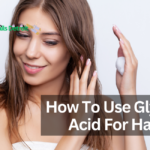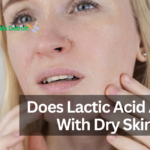On occasion, vitamin C, which is lauded for its myriad advantages in hygiene regimens, imparts an undesirable imprint in skin stains. Serums and products containing Vitamin C, an antioxidant powerhouse, are renowned for their ability to illuminate and even out skin tone.
Nevertheless, obstinate stains may result from improper application or contact with particular surfaces, leading to transient discoloration. Gentle and effective methods are necessary to eliminate these stains.
How Can Vitamin C Stains Be Eliminated From The Skin?
To eliminate Vitamin C stains from the skin without causing irritation or harm, it is necessary to use gentle and effective methods. The following procedures may be executed to remove these stains:
1. Routinely Rinse
Upon discovering the Vitamin C product stains or spills, use tepid water to rinse the affected area. This prompt action may impede the product’s ability to penetrate further into the epidermis.
2. Employ Mild Soap
Utilize a moderate facial cleanser or soap to remove the stain delicately. Apply the cleaner to the skin using a circular motion, completely enveloping the affected area.
3. Vinegar Remedy
To produce a diluted vinegar solution, combine water and vinegar in equal portions. Apply a cotton pad or cloth saturated with this solution to the soiled area gently. The acidity of vinegar can aid in the degradation of Vitamin C residue.
4. The Preparation Of baking Soda Paste
If the stain remains, a paste can be formed by combining baking soda and water. Remove it with water after carefully massaging the paste into the affected area using circular motions.
5. Julian Lemon Juice
As a result of its inherent bleaching properties, lemon juice can be utilized to remove stains. Using a cotton pad, cleanse the afflicted area with fresh lemon juice. After a few minutes, proceed to rinse the area thoroughly.
6. Underwater Peroxide
Hydrogen peroxide dilution can be used with caution to eliminate obstinate stains. Combine it with water in a ratio of 1:10 and apply it delicately to the affected area utilizing a cotton pad. Rinse away for the following several minutes.
7. Apply Moisture
Moisturize the skin with a delicate, hydrating moisturizer following stain removal to restore its natural equilibrium and prevent dryness or irritation.
What Is Vitamin C Doing To Darken My Skin?
Vitamin C, commonly recognized for its skin-brightening attributes, may, on rare occasions, result in skin darkening or discoloration in specific conditions. There are several potential causes for this occurrence:
- When vitamin C serums or products are exposed to air, light, or heat, oxidation can occur, resulting in a color change of the formulation. The potential for oxidation of the Vitamin C product could result in a darker pigmentation, posing a risk of skin discoloration upon application.
- Certain formulations or constituents found in Vitamin C products may cause some individuals’ skin sensitivities or allergic reactions. Skin darkening or discoloration may occur due to this sensitivity, caused by an adverse reaction to the product.
- Combining products with incompatible skincare ingredients or using those not designed to function together may lead to unfavorable reactions, such as the darkening or discoloration of the skin.
- Vitamin C products that are not stored appropriately, including those exposed to elevated temperatures or direct sunlight, may undergo degradation and pigment changes, which may adversely affect the skin when applied.
- Excessive utilization of Vitamin C products or formulations containing exceptionally high concentrations of Vitamin C may inundate the skin with the potent substance, leading to adverse effects such as discoloration, irritation, or inflammation.
What Occurs When Vitamin C On The Epidermis Oxidizes?
The oxidation of Vitamin C on the epidermis initiates a chemical reaction that has the potential to result in various consequences:
- Ineffectiveness and Potency Loss: Oxidized vitamin C becomes ineffective. As the compound degrades, the advantageous characteristics of Vitamin C, including its antioxidant properties and capability to enhance skin brightness, gradually deteriorate.
- Alteration in Color and Texture: Vitamin C serums and products frequently undergo oxidation-induced changes in color and consistency. There is a possibility that the substance will acquire a yellow, brown, or dark orange hue, in addition to a grainy or more liquid texture than before.
- Possibility of Irritation: Vitamin C that has been oxidized may become more acidic and less stable, which could result in skin irritation or sensitivity. The application of oxidized Vitamin C products may result in irritation, redness, or tingling of the skin.
- Peril of Staining: Owing to the modified composition of the serum or product, oxidized Vitamin C products may cause transient discoloration or staining when applied to the skin.
Vitamin C stains on the skin must be eliminated with care and perseverance. Various approaches, from commonplace domestic remedies to specialized skincare techniques, can efficiently address these imperfections. Nevertheless, prevention is frequently the most effective course of action. By exercising caution when applying Vitamin C products and promptly cleaning up any unintended droplets, the probability of staining can be substantially reduced. If blemishes continue to appear, restoring the skin’s natural radiance is possible by applying these tried and true removal methods.
I appreciate your reading.










